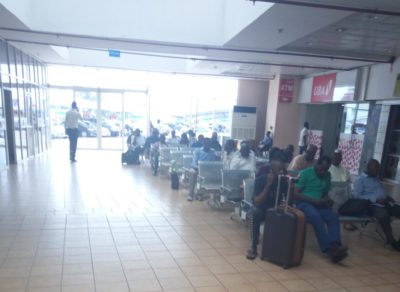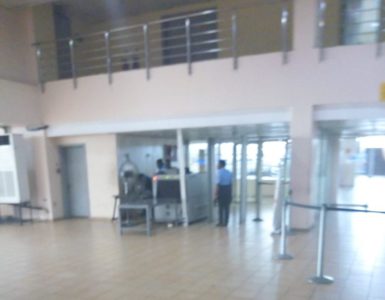
“You won’t be allowed to board the airplane,” the check-in officer said matter-of-factly, hands spread apart, his facial expression revealing no mischievous intent.
Although this reporter knew it was a lie told for the sole purpose of extortion, he played along. For some minutes, the official rummaged through the passenger’s international passport for the umpteenth time, shook his head vigorously as though some infractions had just been discovered, then threw up his face, helplessly. “You may not be allowed in, my brother.”
It was on September 15 and venue was the international wing of the Murtala Muhammed International Airport, Lagos. This was shortly before 9:00 pm, some two hours before the departure of a London-bound British Airways flight.
“The issue is, this is your first time of travelling to the UK,” said the check-in officer, one of about a dozen officials on BA’s check-in counter, whom PREMIUM TIMES later identified simply as Victor.
“The visa is valid, no?” the reporter enquired, feigning ignorance. “Yes it is valid but the boarding people, the Immigration, the Customs… in fact everybody will give you problem because it is your first time,” he said.
“But you can see that I have been to other places before and I have visa from other countries,” the reporter pressed.
But the man would not take that. “You have just been to Ghana, my brother,” he said, with a tone that reeked of condescension. “Just Ghana…”
Victor’s job is to check in passengers and give them boarding passes. But together with colleagues, he has mastered the art of getting his guests part with money and sometimes other belongings. At several points of the airport, attendants like Victor subtly cajole, persuade and even intimidate passengers to leave tips and pay for “help” they provide. Often, first-time and inexperienced travellers are their chief targets.
“What are you going to do now?” Victor asked the reporter after a few seconds of silence. “I don’t know; what do you think I can do?” the passenger replied.
“Okay,” he said, heaving a sigh of relief. “I’ll help you out.”
Paying for help
In the past two years, the Nigerian government has implemented steps it has hoped would make the country investor friendly and encourage tourism.
Some of the places targeted by these initiatives are the airports — the country’s gateway to the world.

Basic airport operations like check-in of passengers have been reformed and illicit and embarrassing activities like hawking and asking for tips have been discouraged.
But despite these efforts, airport officials and attendants still devise ways to extort passengers.
Nigerians are considered some of the most widely travelled people around the world. In 2016, the National Association of Nigerian Travel Agencies disclosed that as much as $2.3 billion was generated by Nigerian travel agents in 2014 from ticket sales for foreign airlines and tour services.
As the airlines rake in huge revenues, their local travel agents have also created and fed on an illegal segment that thrives on extortion of travellers.
The two most affected airports are the nation’s most active international airports — Abuja and Lagos.
At the Lagos airport, Victor soon signaled another official with whom he spoke briefly in whispers, and the official moved toward the passport control section as though she was on surveillance. Minutes later, she came back and, again, they had discussion in whispers.
“You can now go and board, no problem,” Victor said amidst smiles as this reporter moved toward him for feedback. He spoke with the triumphant tone of one who had just solved a major problem.
“And you know you have to ‘settle’ o, bros,” he said, amidst laughter.
To evade such ‘settlement’––a euphemism for bribe––this reporter promised to get back after charging the battery of his phone at a nearby spot. Victor looked unconvinced but he agreed to the request, still.

Getting a spot to charge phones would soon expose this reporter to another extortionist, this time at one of the SERVICOM-inscribed desks stationed adjacent the check-in counters.
In 2017, a report by the National Bureau of Statistics said an overwhelming percentage of Nigerians will accept a bribe when offered or pay a bribe when demanded. The NBS, in its Nigerian Corruption Survey 2017 report, said that Nigerians mainly pay bribes to either speed up procedure, receive preferential treatments or avoid the cancellation of public utilities.
Culture of extortion
PREMIUM TIMES’ findings at the airport revealed that the culture of extortion is not peculiar to officials of any of the airlines, as it is widespread––even among government regulatory agencies.
“There is no charging space,” said a middle-aged woman dressed in a white t-shirt. She sat idly beside a table that had a sticker with the word SERVICOM boldly inscribed on it. “We don’t allow people to just sit down or charge phone here.”
The portion, checks revealed, was designed to address enquiries and other airport logistics concerns. As this reporter tried to plead with the woman, a security staff who walked by would later address the woman as ‘Philo’ – that ostensibly being a colloquial version of the name Philomena. After much persuasion, Ms Philo agreed that this reporter would be allowed into the cubicle to charge his phone for a few minutes.
Shortly, by some minutes before 10:00pm, this reporter moved to exit the cubicle, thinking a mere expression of ‘thank you’ would suffice as appreciation of Ms. Philo’s good gesture.
“Oga, you have not ‘dropped’; you have to ‘drop’ something,” she said, casually, her face turned sideways. “No free meal in Freetown, you know.”
Having understood the word drop to mean ‘tip’, this reporter told her his wallet which contained money was in the checked baggage. Then the shocking revelation: having one’s wallet as part of checked baggage, especially if it contains cash, is the easiest way of getting literally robbed.
“You put your purse inside your check-in bag?” Ms Philo exclaimed, a mixture of surprising and anxiety written on her face. She would later advise this reporter to quickly go get his wallet removed from the luggage before the officials checking in baggage would rip it of available cash. Her fears became heightened when this reporter confessed that he had no padlock around his luggage.
“You’d better go get the purse out of the luggage, or else…” she said. But because it was a lie, this reporter simply wobbled out of the cubicle and moved toward the passport control section.
“Don’t forget me o; go come o,” Ms Philo urged.
Two other officials later confirmed that a number of check-in officers do rob people of their valuables, especially money, if included as part of checked-in baggage without secured lock.
Regulatory officials
At this airport, nowhere is this behaviour more brazen and rampant as the immigration section. Not a few of the officials largely operate with the mindset of making passengers part with their money and not necessarily with the intent of checking passports.
Soon as this reporter navigated his way through the long passenger queue, ahead sat a middle-aged Immigration officer with slightly faded uniform.
“How are you,” he said as he punched into a computer placed at his side of the barricade. “Where are you going to?”
Upon being responded to after courtesies, he would plunge into a long conversation on why it is good to come back home irrespective of one’s destination. But soon as he noticed the disinterest in this reporter’s demeanour, he delivered his major message: “Young man, it’s weekend na. How are we ‘doing’ the weekend na?”
The reporter, already determined not to respond to such conversation, kept mute. The officer would later pass the passport over after smiling sheepishly for minutes with no favourable reply. He finally did a few other checks on his computer and directed that another officer stamp the passport. The reporter collected the passport and moved away only to be confronted by another middle-aged man sitting a a corner. But the new man would quickly let the reporter off the hook upon being told promptly he was a journalist.
In 2017, then Acting President Yemi Osinbajo signed three Executive Orders aimed at facilitating the ease of doing business in Nigeria. The orders, Mr Osinbajo said at the time, essentially sought to save time and cost, and promote transparency and efficiency in the business environment.
The order, to a certain degree, is in conformity with the government’s resolve to generate more money from travel and tourism, considered an important source of revenue for the government. In June, the bureau of statistics said tourism accounted for 34 per cent of GDP and about 20 per cent of the nation’s employment creation in 2017.
In compliance with the executive orders, the Federal Airport Authority of Nigeria (FAAN) introduced new check-in procedures for passengers in accordance with global standard. The agency introduced a central screening and check-in point for passengers, irrespective of the airline they are travelling with. Accordingly, all customised check-in counters used by airlines were removed at the Lagos International Airport.
“Extortion Table”
Prior to that period, the norm was the presence of a long table notoriously used by officials of Nigeria Customs Service, National Drug Law Enforcement Agency (NDLEA), Quarantine Service, Nigeria Immigration Service, and other agencies whose officials frequently extorted passengers under the guise of checking their luggage. The table, colloquially called ‘extortion table’, was often strategically placed beside airlines’ check-in counters. Mr Osinbajo’s executive order ensured the disappearance of the table.
Butracket the operational changes were praised, Herrietta Yakubu, FAAN spokesperson said manual checks could not be totally eradicated still.
PREMIUM TIMES’ investigation revealed that although the absence of the table has reduced corruption and extortion, security agencies still devise means to shake passengers down.
So as this reporter moved through the electronic checks, a manual check was also deployed to again cross-check his belongings. After checks revealed nothing worthy of seizure, an official in blue shirt simply came out open to demand ‘tip’.
“Oga, you are going to the UK, help ‘shake body’ na,” the lady said. But she was ignored. By the time she would demand the second time, this reporter had packed his belongings and was already approaching the boarding gates.
Henrietta Yakubu, the spokesperson of FAAN, said she was just hearing about the practice upon being intimated by PREMIUM TIMES.
According to her, due to FAAN’s daily sensitisation programmes and other checks put in place at the airport, such practices were unusual at the airport.
“There is always sensitisation going on, discouraging workers at the airport from asking for gratification from members of the public,” she said.
“That sensitisation is going on, on a daily basis. There are announcements; public announcements warning airport workers from asking for gratification. There are cameras that have been installed all over the airport.
“Well, I am (just) hearing from you now. We’d check and confirm what you are telling us.”
END

Be the first to comment